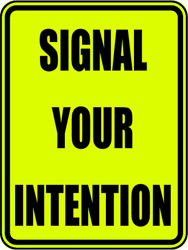
Strait Talk
Disengaging
That was the subject line of the email I received, letting me know the news: Disengaging.
dis·en·gage (disǝn'gāj) —v. to release from something that engages or involves
It's almost as if I was jilted. We were engaged, and now we aren't. "We have appreciated our relationship and your commitment," the email said. Oh, so you don't appreciate our relationship anymore? And how can you call it a relationship if, as you say, only one of us made a commitment?
I've been teaching technical writing and desktop publishing at a local institution for the past fifteen years. During that time, I've taught countless students how to do a mail merge—that is, how to create a document targeting multiple recipients that is customized with individual information. Instead of starting a letter with "Dear employee," a merge allows you to begin with "Dear John," for instance.
Dear John,
We have appreciated our relationship and your commitment… thank you for your efforts.
Ironically, my own disengagement message wasn’t addressed to anyone. The “To:” was followed by a long blank line. I must have been blind copied. There must have been others.
“Hello,” it began. Do they think that little of me that they couldn’t even mention my name, couldn’t take two minutes to do a merge? What if this email address was only created for my dog’s Facebook page? What if my dog had her own relationship with this institution, using her Facebook account to communicate? I do find her lying on my iPad every now and then. What if she’s the one being disengaged, not me?
Imagine if the original Dear John letters had simply used “Hello” instead. A Hello letter? There’s no ring to that, certainly not enough to withstand the test of time and become an entity unto itself. Yes, the point is to be blunt and abrupt, leaving no room for hope, no trace of lingering regard, but still: letters, as opposed to emails, don’t always have the luxury of a disengaging subject line.
There were signs, of course. Dwindling interest. Fewer hours spent together. I suppose I knew it was coming. But maybe commitment is choosing not to see the signs, or not seeing them until it’s too late. Maybe the signs didn’t register because I was focusing on the education of our students. I assume they’ll keep custody.
 My favourite traffic sign stands by an intersection that is not quite a Y and not quite a right turn, where drivers aren’t inclined to use a directional: the main drag veers left, and why signal if you’re staying on the main drag? But the right turn is essentially straight ahead, so why signal if you’re going straight? Few drivers think about the plight of oncoming traffic there, hence the sign: Signal Your Intention.
My favourite traffic sign stands by an intersection that is not quite a Y and not quite a right turn, where drivers aren’t inclined to use a directional: the main drag veers left, and why signal if you’re staying on the main drag? But the right turn is essentially straight ahead, so why signal if you’re going straight? Few drivers think about the plight of oncoming traffic there, hence the sign: Signal Your Intention.
How convenient would it be to carry a sign like that around? If I’d known their intentions, maybe I’d have done things differently. Played the field, kept my options open.
But I’m not bitter. It was fun while it lasted, and I wish them all the best.
I’ll just do it anonymously.